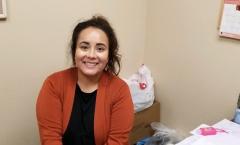
A worldwide pandemic hasn’t stopped Stephen F. Austin State University social work student Lizette Rojas from continuing to work long distance to help Nacogdoches Helping Other People Eat, East Texas’ largest food pantry. Rojas returned to Fort Worth in March after classes on SFA’s campus were transitioned to an online format, but she’s still assisting those who are facing food insecurities and ensuring they receive the help they need.
Following Texas Gov. Greg Abbott’s stay-at-home order and the closure of many businesses, HOPE has seen an 88% increase from this time last year in those asking for food assistance.
“The Nacogdoches community is extremely giving, particularly during times of a crisis,” said Wilma Cordova, SFA professor of social work and member of the HOPE pantry’s board of directors. “Many people are in a situation where they need food or may need help in the near future. Social workers adhere to a code of ethics, and Lizette has demonstrated those values by mobilizing a community in a time of need. Her ability to coordinate services and donations has made a difference for the food pantry.”
Although Rojas returned to her home in Fort Worth when SFA’s campus closed in March due to the pandemic, she’s still helping the food pantry and its clients.
“I call clients to ensure they have food to tide them over,” Rojas said. “I also contact area grocers to organize the collection of boxes the pantry uses to package food for distribution. What others may see as simple tasks can be much more. A phone call or cardboard box can make a difference in how many people we can feed in a given week.”
Rojas also mobilizes volunteers to help ensure the pantry is stocked and remains open.
“Lizette’s ability to be extremely organized and create order in a chaotic situation has impressed me throughout this pandemic,” Cordova said. “Nacogdoches is a unique community in that you must be able to network and do it well. Lizette came into an agency that was already well-respected, and she has worked very hard to bring it to a level that is now even more visible and appreciated.
Rojas said she has spent the majority of her internship closely working with individuals and families in need of food or financial assistance. Some of the areas she’s helped to address include working to stop family violence, closing the health-care gap, harnessing technology for social good and ending economic inequality.
“Those who receive services from HOPE come from all walks of life, and their priority is the need for food, but sometimes they need more. Some clients may need referrals to housing, employment, medical or transportation services, and some may just want someone to listen and offer them the motivation to continue along their paths.”
As the pandemic’s effects continue, Rojas said she is determined to stay focused on making a difference — from SFA’s campus or elsewhere. “Although I’m not physically in Nacogdoches, I’m there in spirit,” Rojas said. “It’s important to me to continue my work helping my East Texas community.”
For more information about Nacogdoches HOPE, visit www.nacogdocheshope.com.
By Emily Brown, marketing communications specialist at Stephen F. Austin State University.



